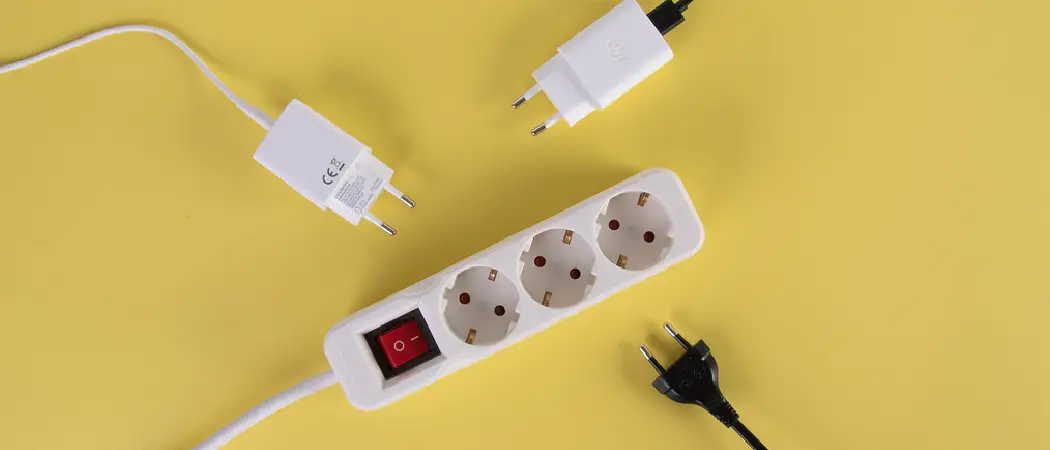Are you planning to use an extension cord for your outdoor electrical needs? It’s important to make sure that the extension cord you are using is safe and suitable for outdoor use. In this blog post, we will discuss the key areas you need to consider in order to determine if your extension cord is safe for outdoor use.
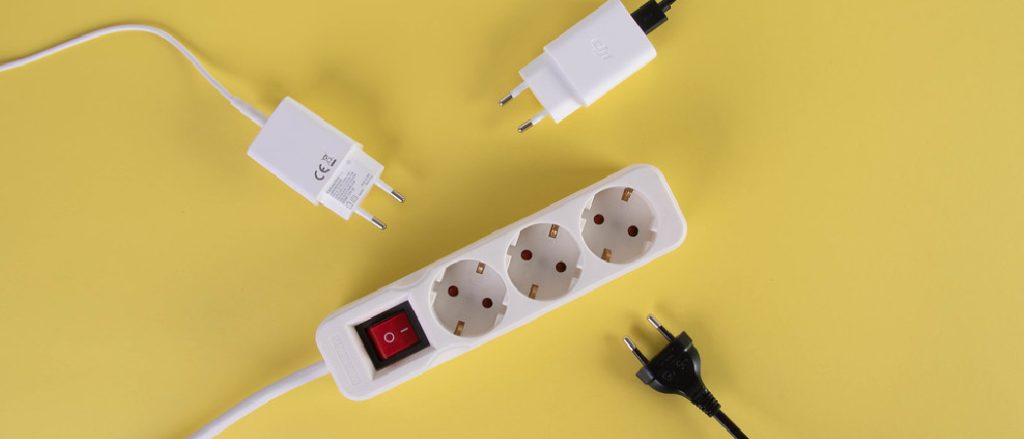
By following these instructions, you’ll be able to ensure your own and others’ safety when using extension cords outdoors. So, let’s dive in and learn how to tell if an extension cord is safe to use outdoors!
Understanding Outdoor Extension Cords
What Makes an Extension Cord “Outdoor-Rated”?
When it comes to outdoor extension cords, one of the main factors that determine their safety is whether they are “outdoor-rated.” This means that the cord has been specifically designed and manufactured to withstand outdoor conditions such as rain, snow, and extreme temperatures. These cords have extra layers of insulation and protection to prevent damage from moisture or other environmental factors.
You can easily identify whether an extension cord is outdoor-rated by checking the packaging or labeling. Look for phrases such as “suitable for outdoor use” or “weather-resistant” to ensure that you are purchasing the right type of extension cord.
Types of Outdoor Extension Cords
There are several types of outdoor extension cords available on the market, each with its own specific uses and safety features. These include:
- General Use Extension Cords: Suitable for light to medium-duty outdoor tasks such as using power tools or lighting up a small area.
- Heavy Duty Extension Cords: Designed for heavy-duty use, such as powering large appliances or equipment in outdoor settings.
- Coiled Extension Cords: These cords are designed to stretch and contract, making them ideal for use in outdoor areas where you need flexibility and portability.
- GFCI Extension Cords: These cords have built-in ground fault circuit interrupters (GFCIs) that provide an extra level of protection against electrical shocks in wet or damp conditions.
It’s important to choose the right type of extension cord for your specific outdoor needs to ensure safety and proper function.
How to Tell if an Extension Cord Is Safe To Use Outdoors: Identifying Safe Outdoor Extension Cords
Inspect the Cord’s Packaging or Labeling
As mentioned earlier, one of the easiest ways to tell if an extension cord is safe for outdoor use is by checking its packaging or labeling. Look for phrases such as “suitable for outdoor use” or “weather-resistant” to ensure that you are purchasing the right type of extension cord.
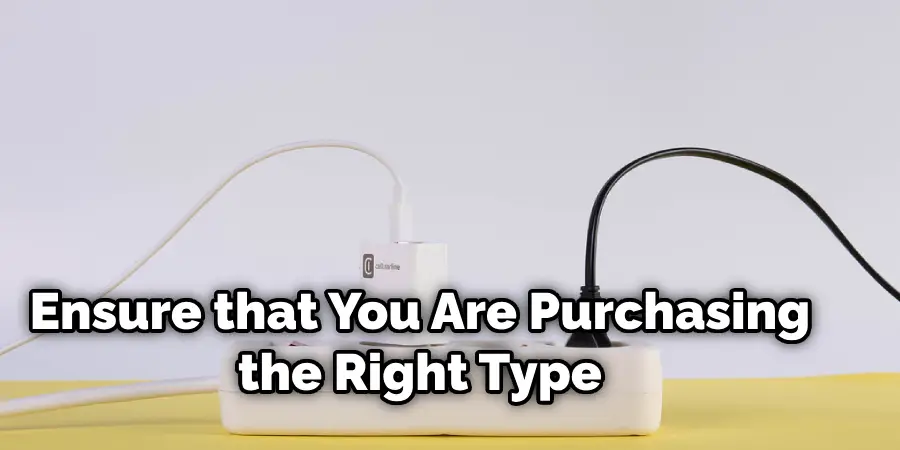
Check the Cord’s Rating and Gauge
Extension cords have a maximum amp or watt rating, which determines how much power they can safely handle. Make sure that the cord’s rating is suitable for your outdoor needs and matches the device or equipment you will be using it with.
The gauge of an extension cord also plays a crucial role in its safety. The lower the gauge number, the thicker and safer the cord is. For outdoor use, it’s recommended to choose cords with a gauge of at least 12 or lower.
Look for Extra Layers of Insulation
Outdoor extension cords have extra layers of insulation to protect them from moisture and other environmental factors. Check for these extra layers, which are usually visible through the cord’s outer covering.
Check for Any Damage or Wear and Tear
Before using an extension cord outdoors, always inspect it for any signs of damage or wear and tear. These can include frayed wires, exposed insulation, or cracks in the outer covering. If you notice any of these issues, do not use the cord and replace it immediately.
Avoid Overloading the Cord
Using an extension cord that is not rated for your specific outdoor needs or overloading it with too many devices can be dangerous and potentially cause electrical fires. Follow the manufacturer’s recommendations and only plug in as many devices as the cord is designed to handle.
Keep Extension Cords Away From Water
Water and electricity don’t mix, so it’s important to keep extension cords away from any sources of water or moisture when using them outdoors. This includes sprinklers, pools, or wet ground.
Use Ground Fault Circuit Interrupters (GFCIs)
If you are using an extension cord in a wet or damp outdoor area, consider using one with built-in GFCIs for extra protection against electrical shocks.
Never Modify or Alter an Extension Cord
Lastly, it’s important never to modify or alter an extension cord, as this can compromise its safety and increase the risk of electrical hazards. It’s always best to purchase a new cord that is suitable for your outdoor needs rather than trying to make modifications on your own.
These tips will help you acquire knowledge on how to tell if an extension cord is safe to use outdoors. Remember always to prioritize safety and choose the right type of extension cord for your specific outdoor needs. Happy and safe outdoor electrical usage!
Beyond the Basics: Advanced Safety Considerations
Inspecting for Damage and Wear Before Use’
Even if an extension cord is designed for outdoor use, it’s important to regularly inspect it for any damage or wear before each use. This will ensure that the cord remains safe and functional over time.
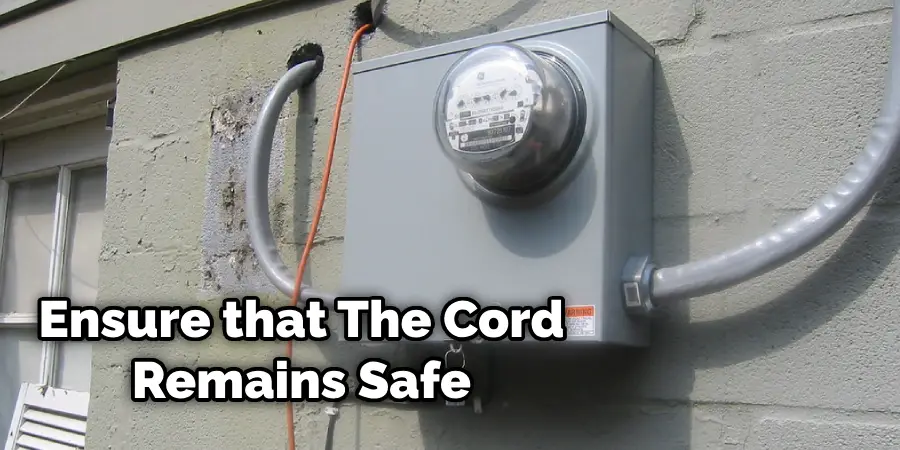
Consider Using Tamper-Resistant Cords
For extra safety measures, consider using tamper-resistant cords, which have additional features such as locking mechanisms or child-proof outlets. These can help prevent accidents and keep your outdoor electrical usage secure.
Use Cord Reels for Storage
Proper storage of extension cords is important to maintain their safety and longevity. Consider using cord reels to neatly store and protect your cords when they are not in use.
Avoid Excessive Coiling or Twisting
When using coiled extension cords, avoid excessive coiling or twisting. This can cause strain on the cord and potentially lead to damage or safety hazards.
Use Cord Covers for High-Traffic Areas
For outdoor areas with heavy foot traffic, consider using cord covers to protect your extension cords from potential tripping hazards.
Educate Children About Electrical Safety
It’s important to educate children about electrical safety when using outdoor extension cords. Teach them to never touch or play with cords, and always keep an eye on them when they are playing near electrical outlets.
By following these additional safety considerations and tips, you can ensure the safe and effective use of outdoor extension cords for all your outdoor electrical needs.
Additional Safety Tips and Precautions
Use Extension Cords as a Temporary Solution
Extension cords should only be used as temporary solutions for outdoor electrical needs. For permanent installations, it’s best to use weatherproof outlets and wiring.
Choose the Right Plug Type
Make sure that the extension cord’s plug type matches your outdoor outlet to ensure proper function and safety.
Keep Cords Elevated
When using extension cords outdoors, keep them elevated off the ground to prevent moisture and potential hazards.
Store Cords Properly
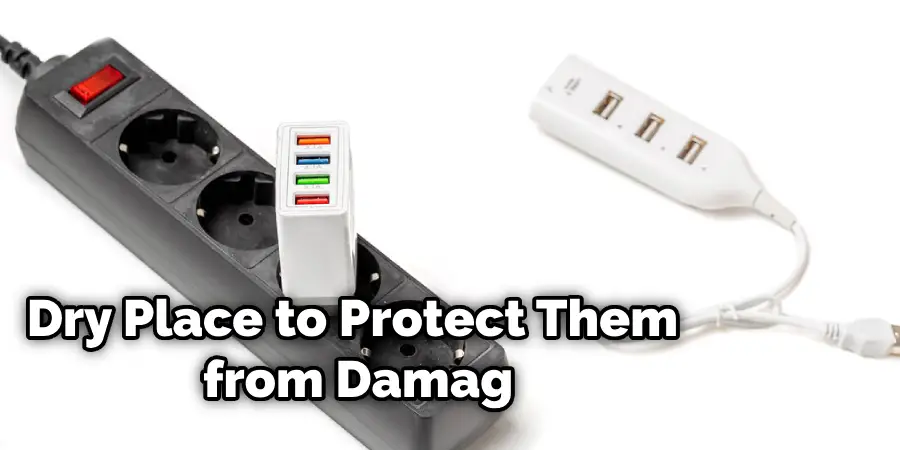
When not in use, store extension cords in a cool, dry place to protect them from damage and prolong their lifespan.
Seek Professional Help for Complex Electrical Needs
For complex outdoor electrical needs, it’s best to seek professional help from a licensed electrician. They can ensure that all wiring and installations are done safely and up to code.
Use Caution When Using Extension Cords with Power Tools
When using extension cords with power tools, make sure to follow the manufacturer’s recommendations and use GFCIs for added safety.
By following these advanced safety considerations and additional tips, you can confidently use extension cords outdoors while prioritizing safety for yourself and others. Remember always to inspect your cords before use and choose the right type of cord for your specific needs. With proper care and knowledge, extension cords can be a safe and convenient tool for all your outdoor electrical needs. Happy and safe outdoor usage!
Common Mistakes to Avoid When Using Extension Cords Outdoors
Using Indoor Cords Outdoors
Using indoor extension cords outdoors can be extremely dangerous, as they are not designed to withstand environmental factors such as moisture and UV exposure. Always choose cords specifically made for outdoor use.
Plugging in Too Many Devices
Plugging in too many devices or using a cord with a lower rating than needed can cause overloading and potential electrical hazards. Always follow the manufacturer’s recommendations and only plug in as many devices as the cord is designed to handle.
Overlooking Signs of Damage
It’s important to regularly inspect extension cords for any signs of damage or wear, such as frayed wires or cracked insulation. Using a damaged cord can increase the risk of electrical hazards.
Not Keeping Cords Elevated
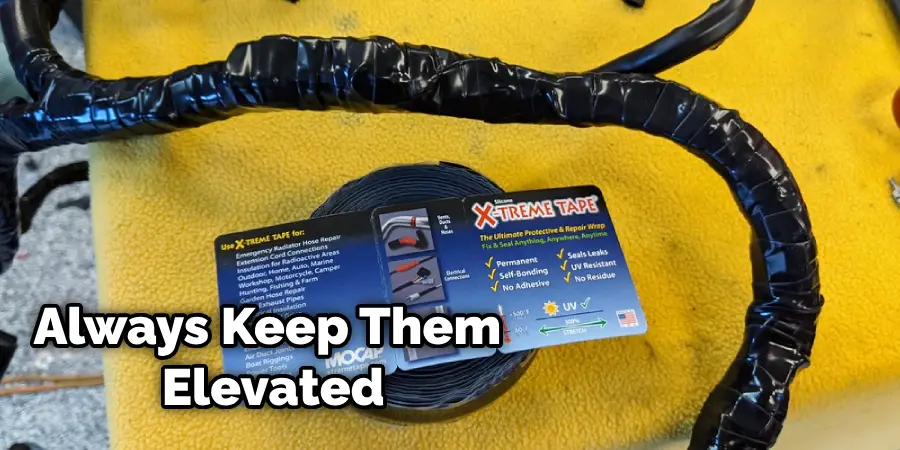
Leaving extension cords lying on the ground or in puddles of water can increase the risk of electric shocks and other hazards. Always keep them elevated and away from sources of moisture.
Ignoring Safety Precautions
It’s important to always follow safety precautions when using extension cords outdoors, such as using GFCIs and avoiding modifications. Ignoring these precautions can lead to serious accidents and injuries.
By avoiding these common mistakes and consistently following safety best practices, you can ensure the safe and effective use of extension cords for all your outdoor electrical needs.
How to Properly Use Extension Cords in Different Outdoor Environments
For Landscaping and Gardening
When using extension cords for landscaping or gardening, make sure to choose a cord rated for outdoor use and keep it elevated to avoid contact with water. It’s also important to regularly inspect the cord for any damage from lawn equipment.
For Outdoor Events or Parties
For outdoor events or parties, consider using heavy-duty extension cords designed for temporary outdoor use. Make sure to keep them elevated and away from foot traffic, and always follow safety precautions such as using GFCIs.
For Construction or Home Improvement Projects
When using extension cords for construction or home improvement projects, choose heavy-duty cords with a higher rating than needed and make sure to use GFCIs. Avoid running multiple cords together to prevent overloading and potential hazards.
For Recreational Activities
For recreational activities like camping or outdoor sports, make sure to use extension cords designed explicitly for outdoor use and keep them elevated and away from water sources. Avoid using them in wet conditions, and always follow safety precautions.
By understanding the unique considerations for different outdoor environments, you can safely and effectively use extension cords for a variety of purposes.
Beyond Extension Cords: Alternative Solutions
Use Battery-Powered Devices
Consider using battery-powered devices for your outdoor electrical needs to eliminate the need for extension cords altogether. This can be a safer and more convenient option, especially for low-power devices.
Install Permanent Outdoor Outlets
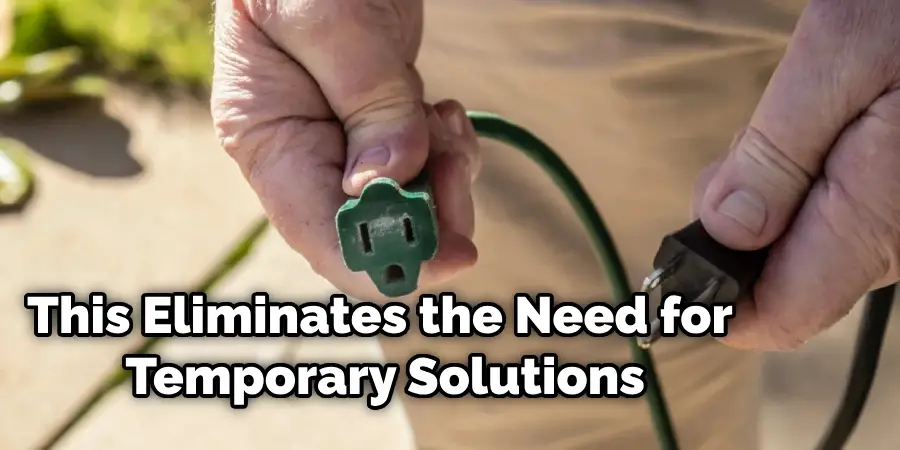
For areas that require frequent use of electricity, it may be worth investing in permanent outdoor outlets instead of relying on extension cords. This eliminates the need for temporary solutions and can be a safer option in the long run.
Utilize Solar Power
In areas with ample sunlight, consider utilizing solar power for your outdoor electrical needs. This can be a more sustainable and cost-effective solution compared to using extension cords or traditional outlets.
By exploring alternative solutions, you can find the best and safest option for your specific outdoor electrical needs.
Common Myths and Misconceptions Debunked
Extension Cords Can Be Used Indefinitely
This is not true. All extension cords have a maximum capacity and need to be replaced after a certain amount of use or when signs of damage are present.
Indoor Extension Cords Can Be Used Outdoors in Dry Conditions
While indoor extension cords may seem safe for outdoor use in dry conditions, they are not designed to withstand moisture or UV exposure and can still pose a safety hazard.
Extension Cords Do Not Need to Be Inspected Regularly
Regular inspections of extension cords are crucial for identifying any potential hazards and ensuring safe usage. It’s important to inspect before each use and replace as needed.
By understanding the truth behind these common myths, you can make informed decisions when using extension cords for your outdoor electrical needs.
Conclusion
Extension cords can be a convenient and useful tool for outdoor electrical needs, but it’s important to prioritize safety when using them. By avoiding common mistakes, understanding how to use them in different environments, exploring alternative solutions, and debunking myths and misconceptions, you can confidently and safely use extension cords outdoors.
Remember always to prioritize safety and follow the manufacturer’s recommendations for the best and safest results. So, use extension cords wisely and keep yourself and others safe from potential hazards. Happy outdoor powering! Keep exploring new possibilities with technology while keeping safety in mind. Thanks for reading this article about how to tell if an extension cord is safe to use outdoors.

